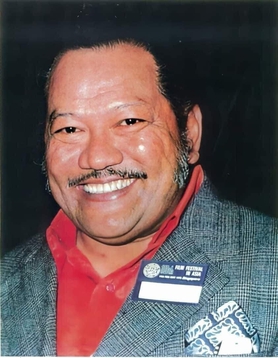
Tan Sri Datuk Amar Teuku Zakaria bin Teuku Nyak Puteh, better known by his stage name P. Ramlee, was a Malaysian actor, filmmaker, musician, and composer famous in modern-day Singapore, Malaysia, Brunei, Indonesia and Southern Thailand. Born in Penang, Malaya, he is regarded as a prominent icon in their shared region.

Yusof bin Ishak was a Singaporean journalist and senior civil servant who served as the first president of Singapore between 1965 and 1970. His portrait appears on the Singapore Portrait Series currency notes introduced in 1999.

The cinema of Malaysia consists of feature films produced in Malaysia, shot in the languages Malay, Mandarin, Cantonese, Tamil, various indigenous languages, and English.
This article lists important figures and events in Malaysian public affairs during the year 1979, together with births and deaths of notable Malaysians and Malaysia-related figures.

Salmah binti Ismail, better known by her stage name Saloma, was a Singaporean-Malaysian singer, film actress, trendsetter and a fashion icon who became well known in the late 1950s.
Bujang Lapok is a 1957 Singaporean Malay-language black-and-white comedy film directed and performed by P. Ramlee. This is the first installment of the Bujang Lapok series of films.
Chinta is a 1948 Singaporean Malay-language black-and-white romantic drama film directed by B. S. Rajhans and produced by Malay Film Productions. It was released on 31 October 1948.
Nilam is a 1949 Singaporean Malay-language black-and-white romantic drama film directed by B. S. Rajhans and produced by Run Run Shaw. The story was written by A.R. Iyer. It starred Siput Sarawak, S. Roomai Noor, Daeng Harris, and P. Ramlee.
Mariam Baharum was an early Singaporean Malay film actress who was known for her work during the 1950s and 60s. She was nicknamed Mariam Tahi Lalat by her fans.
Bujang Lapok Kembali Daa, or The Return of the Three Bachelors is a 1985 Malaysia Malay-language comedy film directed, written and acted in by Aziz Sattar. In this film, P. Ramlee's son, Nasir P. Ramlee (1953–2008) took over his late father's place in the trio. This would be the fifth and last installment of Bujang Lapok film series.
Nasib (Fate) is a 1949 Singaporean Malay-language black-and-white romantic drama film directed by B. S. Rajhans; it stars S. Roomai Noor, Siput Sarawak, Daeng Harris, and P. Ramlee. The film was one of eight popular productions made by the Shaw Brothers Studio in the 1940s.
Ithnaini binti Mohamed Taib, better known by her stage name Anita Sarawak, is a Singaporean singer.
Do Re Mi is a 1966 Malaysian Malay-language black-and-white satirical comedy film directed by and starring P. Ramlee. The concept was partly based on the idea of The Three Stooges with Ramlee playing the character Do. Its success led to two sequels, Nasib Do Re Mi and Laksamana Do Re Mi (1972), Ramlee's last film before his death.
CID 3278 is a Malaysian police procedural action drama series produced by Suhan Movies & Trading, which was aired on TV9 from 9 August 2006 to 26 September 2007. It stars Kamal Affandi Hashim, Faizal Yusof, Salina Saibi, Along Eyzendy and Jesse Lim with Rosyam Nor making a special appearance. The series' theme song was composed and performed by M. Nasir.
Satya Baharom, known professionally as Saadiah was a Malaysian actress and director, who was famous in the 1950s and 1960s during the golden era of the Malay films.

The Malay Film Productions Ltd., also known as the Shaw Studio, is a former film studio located on Jalan Ampas in Balestier, Singapore. The studio operated from 1947 to 1969 with more than 150 movies produced, and was a major contributor to Singapore's "golden age" of Malay cinema. Many of the films are critically acclaimed, a significant number of which involved P. Ramlee as actor, director, writer or composer.

Asiah binti Aman, also known by her stage name Nona Asiah, was a Singaporean singer and actress. Her career started in the 1940s where she worked as a singer during the Japanese occupation. Asiah's first film role was in 1948 when she sang on Malay film Chinta.






